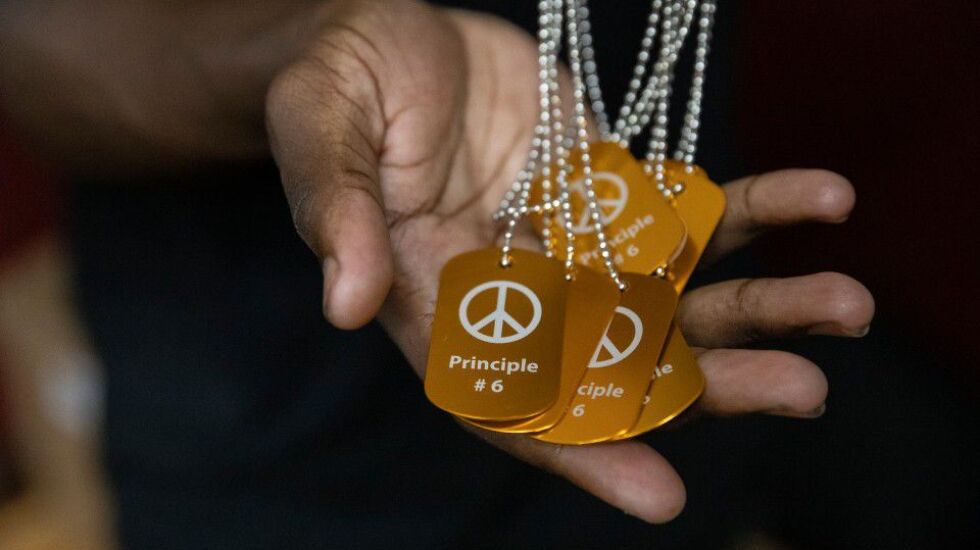
In stuffy classrooms, community centers and churches this summer, a group of West Side high schoolers wrestled with the idea of nonviolence. Most said they yearn for peace but aren’t sure it’s realistic in the world they live in.
One young man said his brother died by suicide after being bullied relentlessly at school. Another talked about his best friend’s murder on his grandma’s porch. This same boy said a cousin was shot and then, just this summer, so was another friend on a bus.
“That be putting me in my little moods,” the teen, looking down, said during a recent session at a North Lawndale community center.
A third teen shared how his brother was hit by a car and he saw him bloodied, lying on the street. His brother was still in pain a year later when their father died.
“I will laugh at some jokes,” the young man said. “And then I will get right back to the sad, depressed state because I think about all the tragic stuff that happened in my life.”
These teens are being trained in a powerful set of principles of nonviolence inspired by Martin Luther King Jr. They are learning from their peers at North Lawndale College Prep, a charter school network. The trainers are called “Peace Warriors.”
Associates of King came up with the principles after he told them, just before his death, the next step in the movement was to institutionalize and operationalize nonviolence.
Among the principles: “The beloved community is the framework of the future;” “Attack forces of evil, not people doing evil;” and “Accept suffering without retaliation for the sake of the cause to achieve the goal.”
A former teacher, Tiffany Childress-Price, came up with the Peace Warriors effort after a year marked by 100 fights among students, said Gerald Smith, a restorative justice specialist at North Lawndale College Prep.
One of King’s associates, Bernard Lafayette, came to the school in 2009 to help.
“He says, ‘I see that this school, on the West Side of Chicago, can become not only a haven, but a launching pad, for students and people embracing and living nonviolence and creating all kinds of necessary positive change,’” Smith recalled. “And from that point, to this point, we’ve just been engaged in the work.”
The pandemic disrupted the efforts, like it did so many things. But, after spending this summer being trained and training others, the students are now once again playing a special role inside North Lawndale College Prep’s two campuses.
The teens are called upon to prevent fights, break them up and to run peace circles. Wearing T-shirts that identify them as Peace Warriors, these teens also offer hugs and candy to students experiencing a tragedy.
Over the years, the Peace Warriors’ work has been instrumental in reducing the number of fights at the school, Smith said. It’s even more important this year, he added, because there are more outbursts and conflicts at the school and elsewhere as students recover from the pandemic.
The Peace Warriors got started even before school began. They were tapped to train the incoming freshmen, to share “how things are done at North Lawndale College Prep,” said Jemia Cunningham-Elder, the interim chief executive director of the charter school network.
Senior DaMarcus Thompson, who trained as a Peace Warrior three years ago, said he doesn’t like to be in a school with a lot of fights. Becoming a Peace Warrior helped him feel empowered to change that. “I felt like I can make a difference,” he said.
But the work is not easy, especially out in the community. Some of the teenagers said in sessions this summer they don’t believe people can be nonviolent if the violence or a threat is against them or a family member. The idea of suffering without retaliation is a difficult concept, and so is the sixth principle: The universe is on the side of justice.
Here’s how one young man put it in a group discussion: “If you see someone killed, you ain’t going to be a peaceful person no more.”
Even the student trainers admitted they felt the urge to retaliate. Deanna Black, a quiet teenager with a cherub face, shared the story of the day her cousin was shot.
“The police came and they said that he was in a foot chase, and so they chased him and they shot him in the back of his head,” Deanna said. “They shot and killed my cousin and said it was suicide.”
Deanna said she often felt angry at the lack of justice for her cousin and wanted to do something about it.
Smith, who is also a pastor, doesn’t expect all of these teenagers will suddenly be transformed after simply being told the principles of nonviolence.
Still, the work is essential, he said. It plants seeds throughout the community and helps the charter school become a haven for students.
Sarah Karp covers education for WBEZ. Follow her on Twitter @WBEZeducation and @sskedreporter.







